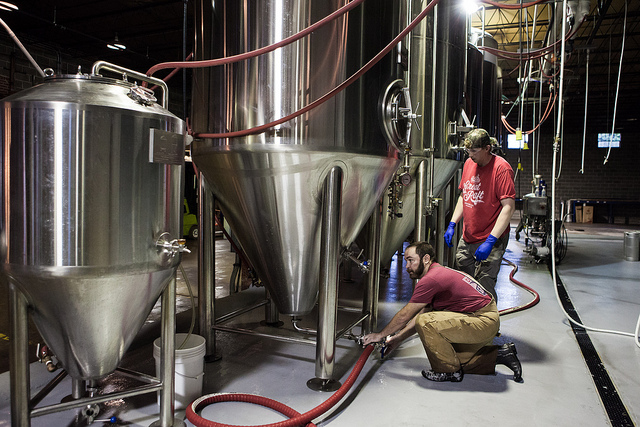The title is a direct quote from Lenny Mendoca, director emeritus at McKinsey & Company.
He makes this observation in an article published in the September 2015 issue of Entrepreneur magazine, which explores the spirit of collaboration in the craft beer industry.
This sector of the industry is soaring while overall beer sales in America have been flat. Additionally, the craft brewery industry is in its sixth consecutive year of double digits growth, while almost no new start up brewery has failed! What can explain this success? Possibly it is a banding together of many “Davids” vs the Goliaths of the industry like Anhauser-Busch (who is rapidly losing ground to the upstarts).
Craft breweries’ unique esprit de corps includes an open-door policy which encourages sharing of equipment, staff training, and even recipes—no secrets. There is a shared value for a culture of cooperation that fuels the growth of this sector. And the author of the Entrepreneur magazine article suggests that with this culture of cooperation, “brewers have created a virtuous cycle that other industries ought to copy.”
It is likely that this approach could work well in any business sector where consumers see the product as unique, local, or artisan and they are willing to pay more for the high quality. What stimulates the mutual cooperation among the innovators is the shared threat of the larger corporation, or the shared opportunity to create business in a new sector such as legalized marijuana.
Stanford Business School’s Hayagreeva “Huggy” Rao, an author of the 2014 book, Scaling Up Excellence: Getting More Without Settling for Less, notes other key emerging cooperative sectors include organic foods, “natural products,” and gourmet food trucks. By now most of us are familiar with food truck rallies, where groups of entrepreneurial chefs gather forces to create a public event. It turns out they support each other on social media and also share their staff and food knowledge. Food truck operators who don’t cooperate with the group are not supported or may even be excluded by the rest of the operators.
For comparison: The ruthlessly competitive “asshole” approach has had some horror story results. McDonald’s is still reviled in some sectors because of bad business ethics stemming from money and corporate influence during Nixon’s presidency when, following its founder’s campaign donation, legislation was passed that allowed companies—such as McDonald’s—to pay 20 percent less than minimum wage.
Then in the early 1990s, the courts found McDonald’s guilty of exploiting children through advertising tactics, indulging in union busting activities worldwide, paying workers low wages, serving dangerously unhealthy food, and ignoring animal cruelty that was perpetrated by its suppliers.
Another cautionary business example is the Mattel company (of Barbie Dolls fame). In an effort to cut costs Mattel outsourced manufacturing to China, but the toys came back coated with lead paint that was highly toxic. The dolls also had small magnets in them that came loose easily and were hazardous if swallowed. The dolls had to be recalled and it caused a terrible public relations nightmare. So, the moral of these tales may be that even more so today than in the past, caring about the workers, suppliers, customers, and environment is good business practice, and cutting corners comes back to haunt.
Acting with concern and curiosity about the unmet needs of employees, suppliers, customers, clients, and investors is a step in a business journey where everyone benefits. How this looks will vary from individual-to-individual, and leader-to-leader for each organization, yet what we can share is the intention that the decisions and actions we are taking will be beneficial, not only for ourselves, but also for everyone involved. A company or leader that does not adopt this larger view is likely to fail.
“Nice guys finish last” is a phrase that echoes in my mind from hearing it so much. It is definitely the antithesis of what is being described as possible here. In fact, in the world of coaching and training in which I participate, a very similar supportive culture has evolved. We lift the whole boat by recommending our peers when they possess the skill that our client needs. We promote each other when it will help the growth of those we serve, and often mentor and guide newbies in our field. In my field, and in the world of craft brewing, “Nice guys finish first.”
I think I’ll celebrate that fact with a sampler at our local brewery. Cheers!
~
Relephant:
Doing Good while Doing Well: Right Livelihood Meets Shambhala Vision.
~
Author: Gayle Van Gils
Editor: Travis May
Photo: Flickr/Shreveport Bossier
~
 Share on bsky
Share on bsky


Read 7 comments and reply